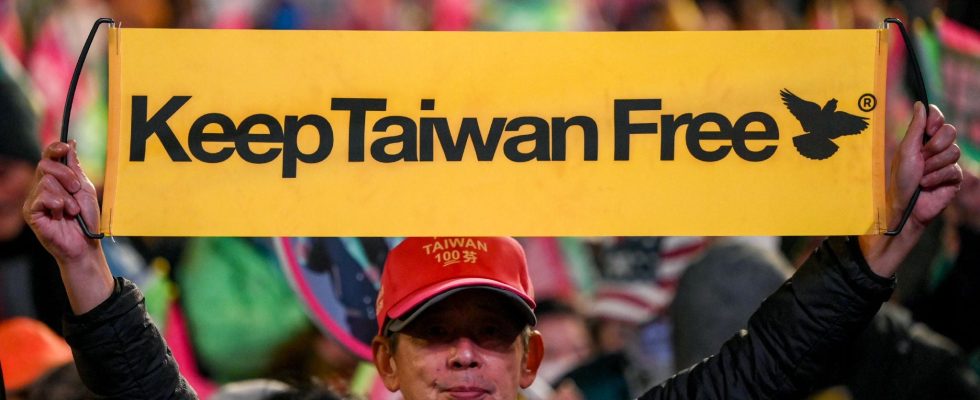Particularly virulent threats. The Chinese army pledged on Friday January 12 to “crush” any effort in favor of Taiwan’s independence, on the eve of a crucial presidential election on the island which, according to Beijing, is part of its territory. “The Chinese People’s Liberation Army maintains high vigilance at all times and will take all necessary measures to firmly crush Taiwan’s attempts at independence in any form,” the Defense Ministry spokesperson said, Zhang Xiaogang, in a press release.
If China makes the headlines of the international press by issuing bellicose warnings, in the national media closely controlled by the Communist Party (PCC in power), nothing or almost nothing has filtered concerning the effervescence of democracy on the island. China’s main news platforms – the official Xinhua news agency, state broadcaster CCTV and the party-run People’s Daily – devoted only minimal coverage Friday to the election to be held in Taiwan the next day.
Other state-controlled websites have barely mentioned the vote in recent weeks, while comments on Chinese social media have either denounced it or shown support for candidates calling for closer ties with Beijing. In recent months, the state press has published articles criticizing Democratic Progressive Party (DPP) candidate Lai Ching-te for his pro-independence positions. There have also been articles highlighting Taiwan’s economic dependence on the mainland, as well as coverage of a protest on the island against an alleged DPP policy of removing certain classical Chinese texts from the school curriculum.
Tightly censored social networks
With its large rallies and virulent public debates, Taiwan’s dynamic election is itself anathema to China’s one-party-dominated political system. Some Chinese media have tried to present democracy as a problem, Taiwan Strait Online calling the elections “chaos from top to bottom.” This week, the newspaper based in China’s Fujian province wrote that “ultimately, its political parties cannot represent the will of the people and the system has shortcomings.”
On Chinese social networks, strictly controlled and censored by Beijing, the vast majority of messages and comments defend the official position. “The election in Taiwan is not a legal election, it is even illegal under the one-China principle,” read one comment, referring to Beijing’s declared policy of “reunification” with Taiwan , by force if necessary. Others openly supported Lai Ching-te’s main opponent, Hou Yu-ih, who represents the Kuomintang (KMT) party, close to Beijing. “(Lai Ching-te Lai) will bring the risk of war to Taiwan… at least Hou is down to earth and does concrete things,” one netizen wrote.
Disinformation campaigns on TikTok
Some comments also questioned the validity of the election by mobilizing China’s nationalist rhetoric toward Taiwan. “The Taiwanese people actually have no say. Whoever is elected can only become the lap dog of the United States,” wrote one user. “Taiwan is an integral part of China. How China controls Taiwan is a matter for the Chinese people themselves,” we can also read.
China’s attempt to discredit the vote also resulted in a wave of disinformation mainly targeting candidates calling for the island’s independence before the vote. A Chinese hashtag mocking Lai Ching-te was viewed more than 8.5 million times on TikTok, and derogatory reactions and other conspiracy theories abounded in response to posts and videos against the DPP. Many TikTok videos were created on Douyin, the Chinese version of the video app, an AFP Fact Check investigation has revealed. We will know this Saturday what choice the Taiwanese voters will have made, for the first election in a year 2024 full of dangers.
